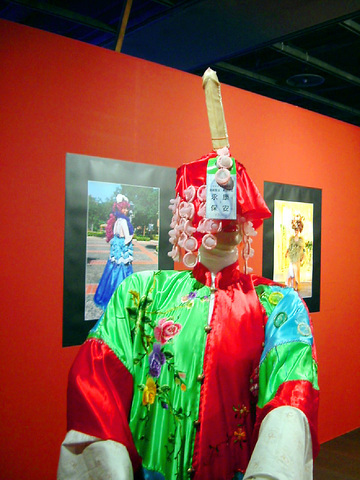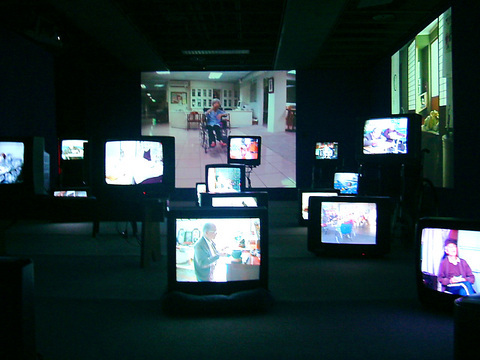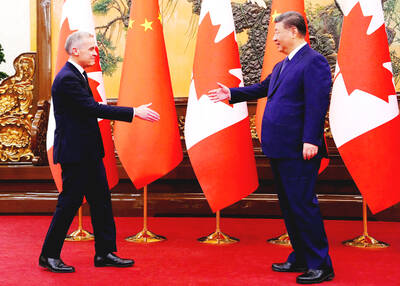Nine artists have collaborated with each other and with underrepresented groups to create Taipei on the Move (TOTM), an exhibition that strives to empower the voiceless.
The project began last November during three days of workshops and events which sought to link students, homemakers and seniors. Documentation of what took place and its material results will be displayed in Eslite Vision Gallery until Jan. 23.

PHOTO: SUSAN KENDZULAK
"What do Taipei youth think about family, schools, sex and politics?" -- the exhibit itself links the project with the public and this provocative text on a wall helped link the activities with the viewers and included young people's interesting responses. Problems exist among these effective ideas, though, such as the text being sprawled out on a wall about 9m long, making it difficult to read.

PHOTO: SUSAN KENDZULAK
The participating artists -- Wu Mali, Chen Yung-hsien (
Cities on the Move was dynamic, as it was a traveling show in flux, varying each time with its different venues and reflecting the rapid changes in Asia brought about by globalization. TOTM, however, doesn't come close to its predecessor.
Even though TOTM's brochure states: "A city in motion; art in action; images, sounds and words expanding understanding," the exhibition does not seem to get its finger on Taipei's urban pulse, as it just conveys images of what seem like weekend activities -- dancing, parading and talking -- rather than showing profound, multi-layered art works.
The collaborative show includes The Empress' New Clothes, a work by conceptual artist Wu Mali that explores women's roles in society. Guided by Wu, the participants created clothes to construct various identities such as the Forest Queen, Primitive Queen, Condom Queen and the Queen of Pain.
Adorned in their handmade constructions the women paraded in front of wedding photo boutiques and in front of the Taipei Fine Arts Museum. One participant stated: "My gown has become a canvas. The street has become a gallery."
Wu's participation extends her former interests. She runs a sewing workshop for disenfranchised homemakers called the Taipei Awakening Association's Stitching Sisterhood Workshop. The workshop is an activist project in that it empowers the women and helps them get in touch with their creative potential.
A more compelling installation in the show, however, was Chen Yung-hsien's Senior Concern. In a huge, dark room, TV monitors -- some placed in wheelchairs -- and full-screen projections show images of senior citizens in a nursing home.
Student life is also explored in TOTM. A video of Hsieh Chi-pin (
Suzanne Lacy who is well-known for creating public-based performances teamed up with Unique Holland and Sheva Gross to create monochrome color platforms for students wearing matching shirts to sit on for a recorded discussion. Lacy said she wanted "to allow people to have their own space for their own voice.
On the surface, it seems like these projects are empowering and ultimately beneficial to the community they serve. These kinds of projects where artists take on the role of leaders/teachers within communities of non-artists emphasize a feel-good aesthetic that seems to offer a voice to the voiceless common people. But, more often, participants have been given strict guidelines to which they conform and usually tend to adhere. Rarely does a participant think outside of the box. So the voice of the community may actually be more the artist who, in his/her paternalistic role, acts more as puppet master than spirit medium.
Countless artists from all around the world have collected people's wishes and dreams, to the point that this is becoming a cliche and fairly uninspiring idea. Yet, one TOTM project last November seemed to subvert this principle in a very subtle way.
Architect Marco Casagrande and sculptor Martin Ross created Trojan Rocking Horses, in which citizens wrote down their dreams and wishes and placed them into welded metal horses that were then paraded around the city.
The project culminated in a performance where Mayor Ma Ying-jeou (
Exhibition notes:
What: Taipei on the Move (
Where: Eslite Vision Gallery, B2, 245, Dunhua S Rd, Sec 1, Taipei (
When: Daily, 11am 10pm, through Jan. 23

On a harsh winter afternoon last month, 2,000 protesters marched and chanted slogans such as “CCP out” and “Korea for Koreans” in Seoul’s popular Gangnam District. Participants — mostly students — wore caps printed with the Chinese characters for “exterminate communism” (滅共) and held banners reading “Heaven will destroy the Chinese Communist Party” (天滅中共). During the march, Park Jun-young, the leader of the protest organizer “Free University,” a conservative youth movement, who was on a hunger strike, collapsed after delivering a speech in sub-zero temperatures and was later hospitalized. Several protesters shaved their heads at the end of the demonstration. A

Google unveiled an artificial intelligence tool Wednesday that its scientists said would help unravel the mysteries of the human genome — and could one day lead to new treatments for diseases. The deep learning model AlphaGenome was hailed by outside researchers as a “breakthrough” that would let scientists study and even simulate the roots of difficult-to-treat genetic diseases. While the first complete map of the human genome in 2003 “gave us the book of life, reading it remained a challenge,” Pushmeet Kohli, vice president of research at Google DeepMind, told journalists. “We have the text,” he said, which is a sequence of

In August of 1949 American journalist Darrell Berrigan toured occupied Formosa and on Aug. 13 published “Should We Grab Formosa?” in the Saturday Evening Post. Berrigan, cataloguing the numerous horrors of corruption and looting the occupying Republic of China (ROC) was inflicting on the locals, advocated outright annexation of Taiwan by the US. He contended the islanders would welcome that. Berrigan also observed that the islanders were planning another revolt, and wrote of their “island nationalism.” The US position on Taiwan was well known there, and islanders, he said, had told him of US official statements that Taiwan had not

Britain’s Keir Starmer is the latest Western leader to thaw trade ties with China in a shift analysts say is driven by US tariff pressure and unease over US President Donald Trump’s volatile policy playbook. The prime minister’s Beijing visit this week to promote “pragmatic” co-operation comes on the heels of advances from the leaders of Canada, Ireland, France and Finland. Most were making the trip for the first time in years to refresh their partnership with the world’s second-largest economy. “There is a veritable race among European heads of government to meet with (Chinese leader) Xi Jinping (習近平),” said Hosuk Lee-Makiyama, director